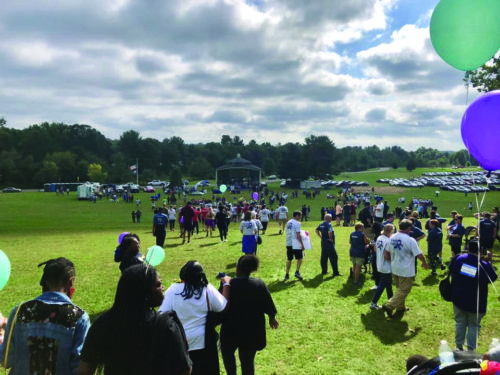Seven hundred people showed their support for suicide prevention and awareness at Hamden’s 8th annual Out of the Darkness walk on Sunday, Oct. 7.
[media-credit name=”Photo Courtesy of AFSPTC” align=”alignright” width=”500″] [/media-credit]Since 2004, the American Foundation for Suicide Prevention (AFSP) has hosted the Out of the Darkness walks in communities across America with the goal of raising money for suicide prevention programs, uniting those affected by suicide and educating communities about mental health.
[/media-credit]Since 2004, the American Foundation for Suicide Prevention (AFSP) has hosted the Out of the Darkness walks in communities across America with the goal of raising money for suicide prevention programs, uniting those affected by suicide and educating communities about mental health.
“These walks are about turning hope into action,” said AFSP CEO Robert Gebbia in a Hello Woodlands interview. “Suicide is a serious problem, but it’s a problem we can solve.”
This optimism was a common thread throughout the event, which opened with a series of speakers sharing their personal stories relating to suicide.
“From my point of view, the highlight was watching the community unite,” said Connecticut Area Director Michelle Peters. “There was a large amount of families and individuals letting me know that the opening ceremony really brought everybody together…. Participants said not only was the whole event therapeutic and cathartic for them, but it also let them realize that they weren’t alone.”
Solidarity was another theme of the afternoon; one of many activities available to participants was set up at an area of remembrance, which became filled with photos and messages. The walk itself was a culmination of support, as individuals and teams marched side by side, united against suicide.
Despite its current success, Out of the Darkness has humble beginnings. Back in 2004, there were only 24 walks across the country, and four thousand walkers. By the end of 2018, 425 walks will have taken place with the help of a quarter of a million participants. As for Hamden’s trajectory, 1,000 people are expected at next year’s walk.
“We’re above the national average in that we have 84 cents of every dollar go back into the community, so that’s huge, really,” said Peters in regard to the money raised by Out of the Darkness.
Staff member Caleb Warner, assisting with his third walk and attending his seventh, was optimistic about the event’s effectiveness in reducing suicide and creating a supportive, educational network for communities.
“I can say from being here, doing this walk for seven years, that there is now more suicide awareness. I’ve seen this walk grow from one hundred people to several hundred, so that means people are willing to talk about [mental illness and suicide].”
Largely due to the event’s popularity, the AFSP has been able to set a goal of reducing the national suicide rate by 20 percent by 2025 as part of its Project 2025 initiative, which would save 20,000 lives in a span of 10 years. Reaching people through Out of the Darkness, both in communities and on campuses, is an integral part of their research examining the impact of firearms, healthcare, emergency departments, and healthcare systems on the occurrence of suicide.
The AFSP is also conducting projects including Talk Saves Lives, Seize the Awkward and the Interactive Screening Program, which emphasizes the importance of discussing suicide, whether with friends or in confidentiality.
“We must not allow suicide to continue to cut short the lives of our loved ones,” Gebbia said in a recent press release. “Let’s state loud and clear that depression and other mental illnesses are just that–illnesses. Not weaknesses. Not character flaws. People battling these illnesses not only require, but deserve understanding, treatment, and the same compassion as people afflicted with any other illness.”
According to the AFSP’s own estimates, 44,965 Americans die by suicide and 1.4 million attempt each year. Sixty percent of Americans experience a loss to suicide, meaning that the impact is much greater than what is reflected by the suicide rate alone.
The National Suicide Prevention Lifeline is always available at 1-800-273-8255. If you would like to support the cause of suicide prevention, you can donate to the AFSP at afsp.org.
“I’m more than confident that we are going to achieve our goal of diminishing suicide,” Peters said. “I always say, this is the only job I’ve ever had in my life where I would love to be put out of business.”







